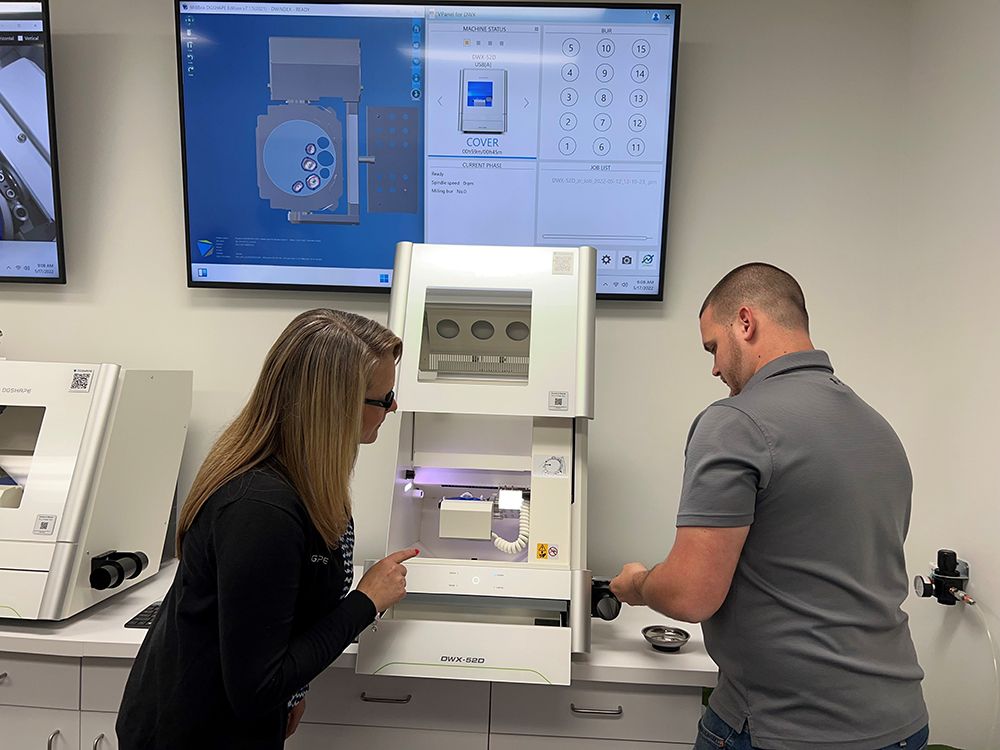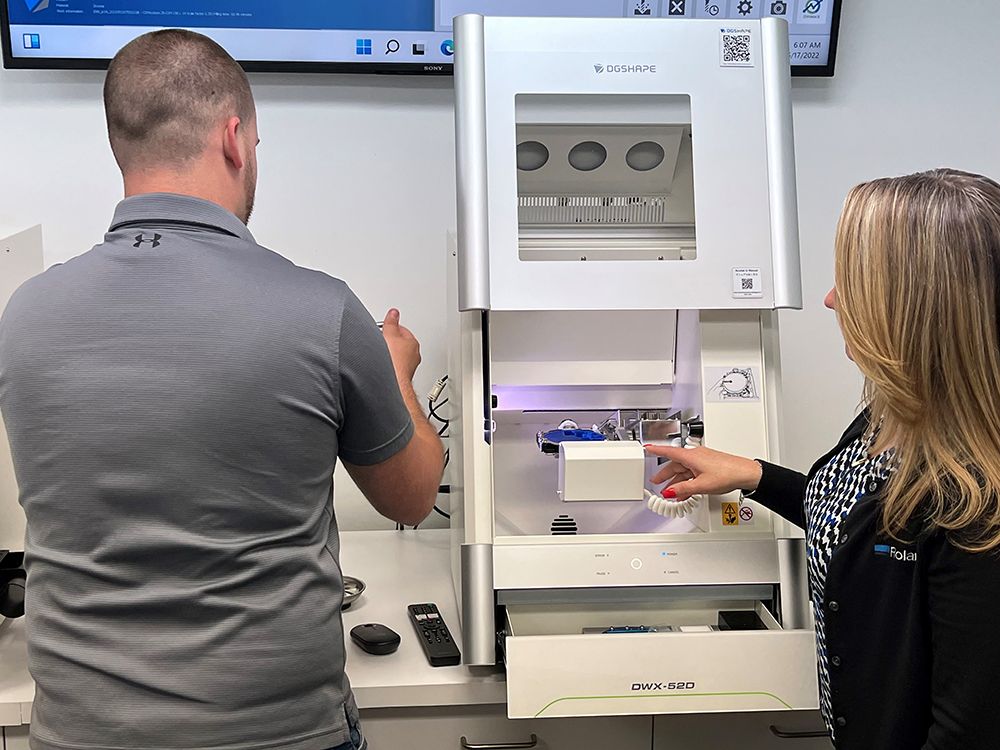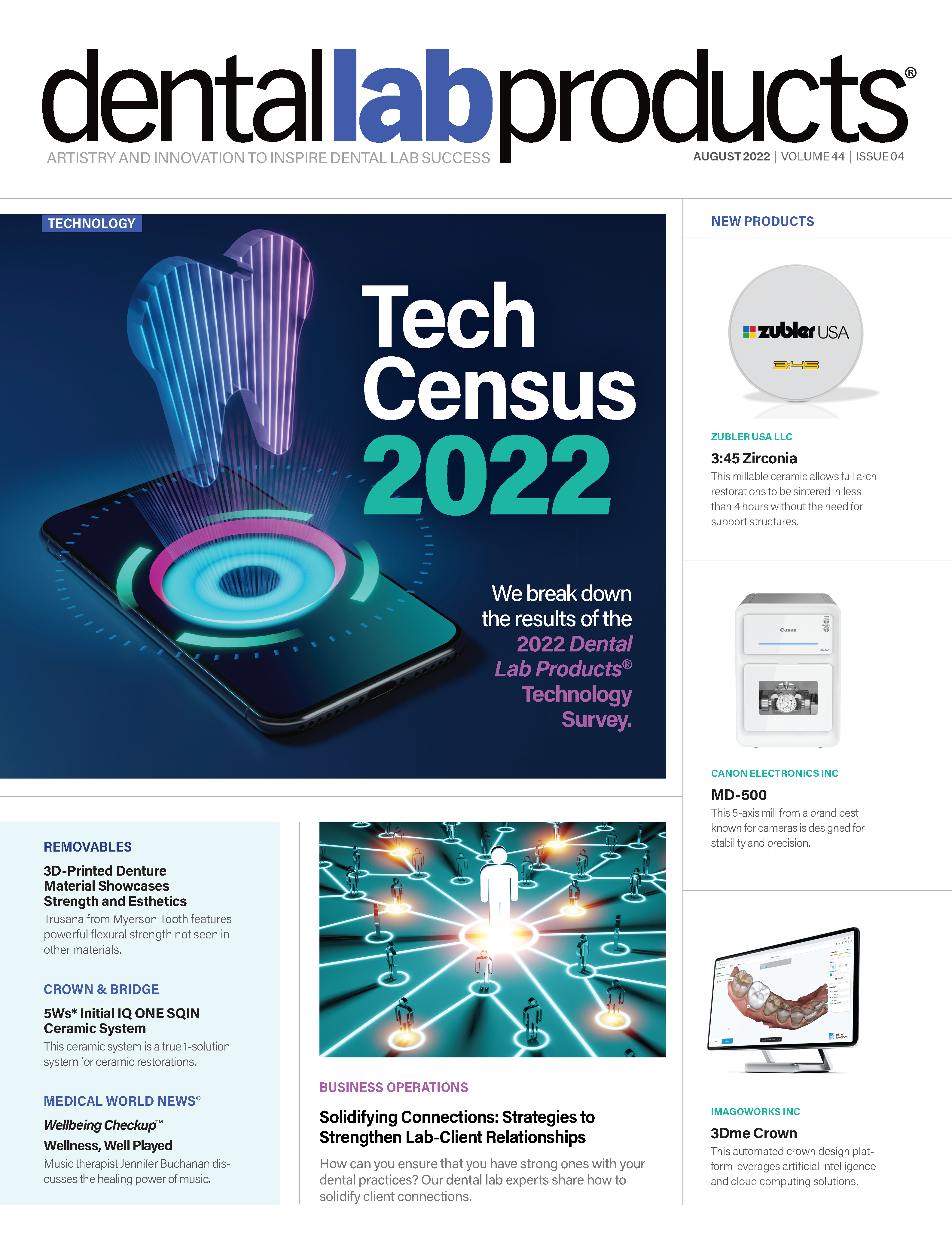Bolster Lab-Client Relationships with Expert Advice
Our dental lab professionals describe how they develop long-lasting connections with dental practices.

Relationships are key to a thriving dental lab business, but they need trust to flourish. As legendary sales expert Zig Ziglar says, “If people like you, they’ll listen to you, but if they trust you, they’ll do business with you.” So how do you ensure you have strong relationships built on trust with dental practices? We spoke to several dental lab experts who shared their secrets to solidifying client connections and strengthening lab-client relationships.
Dental practices want labs to provide value with their knowledge about dental restorative design and production. Conrad Rensburg, ND, NHD in Tech, the owner of Absolute Dental Services, and Jack Marrano, CDT, director of signature prosthetics at Absolute Dental Services, think being a resource to clinicians with new products, technology, and workflows is crucial.
For example, when Absolute Dental Services implemented new technology for dental implants in 2000, they became the clinicians’ resource on taking proper impressions for the workflow, Rensburg explains. With 2 education centers onsite, providing clinicians with educational opportunities remains a priority for Absolute Dental Services today. “From a business perspective, education has been the strongest driver in building these relationships,” Rensburg says.
Marrano agrees, adding that materials expertise is also essential. Clients can go anywhere to have a crown made, he says, so labs should position themselves as where to go for a solution. Rensburg and Marrano judge their success in this area by whether clinicians rather than their representatives call them to learn about new materials or protocols. “Then we know we’re doing our job right, because they trust us to give them the right advice,” Rensburg says. “The dental technician of the future should be a resource and not just a technician.”
“World-class restoration is a by-product of a first-class relationship,” Marrano adds. “Things are moving faster, and dental practices are leaning on the lab more than ever.”
Keith Crittenden, byproduct president and CEO of the AmericaSmiles® Network, says a dental lab can also leverage its knowledge gained from working with different practices. By working with multiple clinicians, labs learn much faster than dentists about restorative materials and techniques. “The lab needs to see itself as a valuable resource for communication and information about all dentistry rather than exclusively [make] false teeth,” Crittenden says.
Lisa Aguirre, product manager of dental solutions for Roland DGA, says collaboration is essential to building relationships. Aguirre refers to the adage “Two heads are better than one,” adding that working together is especially important for restorative dentistry. However, communication is a crucial part of that equation, too. “When things don’t go right with a patient’s treatment plan or restorative case, there was a communications breakdown somewhere,” Aguirre says. “Whether from dentist to laboratory or even from patient to dentist, any communication breakdown can affect the outcome.”
Aguirre says clinicians typically take extra time with patients to ensure they understand the risks and benefits associated with a proposed treatment plan and set realistic expectations for the final restorative treatment outcome. However, they do not always communicate this information to the dental laboratory, and that’s where the trouble starts. “Effective collaboration is vital between the dental laboratory and clinician to ensure that everyone is working toward the same objectives in addressing the clinical and esthetic needs of the patient,” Aguirre explains.
Richard Jentsch, head of research and development at Opulent Digital Specialists, agrees that communication with the clinician and their staff is essential. Keeping these lines of communication open with the office manager or dental assistant provides labs with the chance to fix problems or provide alternate solutions. Labs should also check in regularly to get feedback, even if there haven’t been complaints. “Don’t assume no news is good news, because it might not be,” Jentsch says.
Jentsch also recommends talking to the practice about their goals and timetable. A lab can then take a consultative approach. Without that conversation, the lab’s advice can point the practice in the wrong direction, creating gaps in the relationship. “At some point, the gap is so big they might feel a different partner would be better suited for them,” Jentsch says.
David Lesh, founder of Dale Dental and Concert Dental Labs and a consultant at 8&9 Dental Lab Consulting, agrees that regular contact and customer feedback are critical. The feedback card is an effective and overlooked tool in this effort and the closest a lab can get to real-time customer feedback. Lesh says doctors are willing to be more honest on a feedback card, compared with a phone call or in-person conversation, because it is less confrontational. “I don’t know [whether] there is a better way that keeps your finger on the pulse of client sentiment. It’s the No. 1 way to build relationships,” Lesh says.
Lesh also recommends keeping track of scores and celebrating your successes. For example, when his last dental lab reached a 4.9 out of 5 average overall quality score on their cards, they sent out a press release reading “Dentist Rated 4.9 Out of 5 for Overall Quality.” Lesh also told their customers the lab’s performance bonuses were tied to the feedback card scores. As a result, the clients thought the lab team was invested in their best outcomes.
“But like many things, feedback cards can do as much harm as good if you’re not looking at them. So if there’s a ‘poor,’ ‘fair,’ or ‘please call me,’ it needs a response immediately and cannot sit in an inbox in the unpacking area,” Lesh explains.
Humanizing the company is essential to relationship building as well, Lesh says. He encourages video conferencing over phone calls to discuss cases, putting pictures and bios for the customer service team and team leaders on the website, and adding photos to email signatures. In addition, he recommends open houses for local accounts at least once a quarter. Lesh’s previous lab hosted a Manicure Night a few times a year for local accounts and their entire office teams. “They loved it,” Lesh says. “And it changes the dynamic when you call that front office, or if something goes wrong with a case.”
David Turpin, the fourth-generation owner of Spartan Dental Lab, thinks availability is vital. He provides his mobile number and tells clients to call or text anytime. This access is helpful for digital workflows when dentists need immediate scan feedback or if practices need the lab to help with scanner problems. “It improves the digital workflows especially when, through our communication, we don’t have to bring the patient back,” Turpin says.
Doing More With Your Accounts
Sometimes practices do not know all you can do. Overcoming this hurdle and doing more for your clients starts with communication, Jentsch says. Practices will not know you have more experience or training unless you tell them. If they like their current supplier and are not ready to switch, Jentsch suggests offering a deeply discounted or free parallel case. “The important part is to have them produce it the way they’re used to with the provider they’re used to, but at the same time, give them one of your cases. Then, let the doctor and the patient decide which they prefer,” Jentsch says.
Today's technology has opened up new opportunities for lab techs with new workflows. It's important to make your dentist clients aware of everything your lab can do for them.

Crittenden takes the same approach with first-time cases. There is no shame in telling the doctor you have not done a case like this before; everybody has their first case sometime. Plus, it can help you do more things with them in the future. “If they trust you in other areas, maybe they will trust you with this one as well,” Crittenden says. Jentsch also encourages labs to discover their advantage. Maybe it is quality or a faster turnaround time than the other supplier. Perhaps you can integrate the practice’s technology, like the Imetric system or photogrammetry software, better than their current system. “Maybe the doctor is looking for something they haven’t been able to find with other laboratories,” Jentsch says. “If they don’t know how the technology works and nobody else they work with knows either, but you do, you have an advantage.”
Crittenden also thinks labs should ask dentists questions about how they choose a lab for a project. This conversation allows a lab to talk about other opportunities. “You can tell the doctor, ‘Look, I do these all the time. I’m just not doing them for you,’” Crittenden says.
Turpin agrees that finding out the pain points is an excellent way to uncover opportunities with your customers. “Honestly, most of the time, it’s communication,” Turpin says.
“In most cases, this sounds more complicated than it is, and the fear of the unknown comes into play,” Aguirre says of practices that do not want to try a new supplier. “As a dental laboratory professional, patience is key, along with a willingness to work closely with the clinician, especially on difficult or larger cases.”
When working on complex cases or helping doctors with new, more efficient workflows, Turpin will go to their practice. He’s found that explaining over the phone isn’t enough, and clinicians are hesitant to make any sort of change to workflow. Offering to go to patients’ appointments to walk them through step by step is a great way to gain trust and build a lasting relationship. “When I offer to come to their practice to help them through a process, they tell me, ‘I didn’t know you did that,’” Turpin says. “I explain we are partners, and it is my job to make sure they are comfortable with the process so we can deliver the best outcome for the patient. For the most part, they are grateful for the time spent with them.”
Aguirre says clinicians can also be hesitant to ask questions to avoid seeming unknowledgeable or out of the loop. She sees this as a prime opportunity for dental laboratory professionals to expand and solidify their relationship with the clinician by offering to educate and support them. “Knowledge is wealth,” Aguirre says. “Spending just a few extra minutes to assist a clinician goes a long way.”
Rensburg believes in anticipating the clients’ needs. He listens to what practices say and anticipates the questions they might ask. Providing pertinent information up front makes dental practices feel more comfortable that the lab is a valuable and knowledgeable resource. “So instead of waiting for them to ask it, answer it,” Rensburg says.
Avoid Damaging Relationships Unconsciously
You want to do what is best for your customers, and you do. However, what if what you thought was helping the relationship was hurting it? Certain actions can damage your relationship by mistake.
The fastest way to ruin a relationship is letting a practice go into arrears with payments, Crittenden says. When the terms stretch to 45, 60, or 90 days, Crittenden says the relationship sours and the lab suddenly cannot do anything right. “The doctor no longer sees you as a partner, but as this albatross or burden around their neck,” Crittenden says. “You’re helping maintain a healthy relationship by forcing the doctor to stay current.”
Crittenden says labs also unconsciously damage their relationships with practices by accepting unacceptable work. He says dentists want to be held accountable; they don’t want to do unsatisfactory work. If you let them give you less than what they are capable of, dentists will start to disrespect you and blame you for problems. “The lab has to say, ‘I need better quality,’” Crittenden says. “Some of my best customers now are customers with whom I took a very firm stance on payment and quality. As a result, they’re still with me, paying their bills on time and providing better quality work.”
“We are up-front in our communication with our doctors [if] what they sent will not work. If it’s bad coming in, it’s only going to be bad going out,” Turpin agrees. “We are all too busy to do it twice, so we do our best to let them know our concerns right away before starting the case. Most of them appreciate this feedback and will send a new impression or scan if asked.”
Language matters as well. How you ask for better work is essential, Aguirre says. “The worst thing a dental laboratory professional can do is make extra demands of the office or clinician while handling a case. Additional demands give the impression of being inflexible, too busy, or unwilling to help. Instead of placing demands on dental office staff or clinicians, provide them with options,” Aguirre says.
For example, a lab may ask the clinician to bring the patient back for a new impression to proceed with the case. Aguirre suggests an alternative, like “‘For optimal results, the best option would be to bring your patient back in for a new impression. Is this possible?’ By putting the control in the clinician’s hands, it shows you trust them to make the right call and that you are interested in collaborating, not dictating,” Aguirre says.
Jentsch says mid- to large-sized labs often implement quality control by choosing unified settings for their case output. However, while he understands what these labs are trying to accomplish, he thinks the standardized approach misses the fine details of the doctor’s expectations. “It might not be as custom or individualized as a doctor wants,” Jentsch says.
Along the lines of valuing individuality, Lesh thinks a commoditization mind-set can damage labs’ relationships with practices. Thinking labs do all the same work is a trap. Quality is always a competitive differentiator. “Some labs think the whole industry is on a downward spiral in price, but only because they don’t think they are doing anything better than anybody else. Labs that do good work can charge a fair price for it,” Lesh says.
Rensburg agrees that trying to be the most affordable lab can damage relationships. At Absolute Dental Services, they tell their customers how much they charge and why. “I always follow that up by saying, ‘If our quality doesn’t justify our price, you should not be using us,’” Rensburg says. “In a world where everyone’s nickeling-and-diming and trying to get a cheaper deal, it goes back to quality work. If you do quality work, you should be proud of it.”
Shying away from conflict is another crucial way labs unconsciously damage relationships, Rensburg says. He sees conflict as a relationship-building opportunity. When there is a problem, he advises labs to own the mistake, apologize, and offer a solution. This approach will help customers who are upset with you become your fans.
“I always say it’s not if I am going to make a mistake; it’s when,” Marrano agrees. “As soon as you say ‘I’m sorry,’ it immediately defuses the situation. But then, take immediate action and follow through.”
“The worst thing you could do is not deliver that solution,” Rensburg says. “Then that clinician loses faith in you.”
Most importantly, Rensburg wants dental technicians to be proud of what they do and their integral role in patient care. “You should be proud to say, ‘I’m a dental technician, and I bring value, which costs money. If you don’t want to pay it, then I have no problem not working with you.’” Rensburg says.
“Learn how to produce high-quality work, be proud of your standard, own what it is and what it is not, and charge accordingly,” Rensburg continues.
